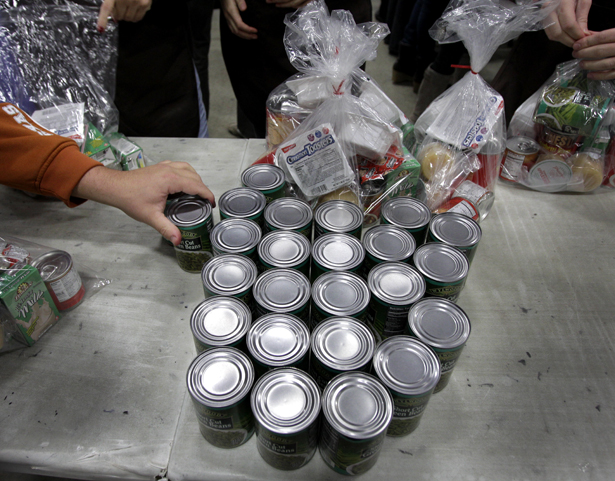
The Cleveland Foodbank in Cleveland, Ohio. (AP Photo/Amy Sancetta)
The first time Michelle Venus went to the food bank in Fort Collins, Colorado, she cried. A few years earlier, as a homeowner in a $75,000-a-year job with savings and a pension, she had donated to the bank. Now, thanks to two bereavements and some downsizing, she was there to pick up food. She didn’t cry while she was there, she said. “But before and after. It was not what I’d expected for myself or from myself. It was just a really hard day.” Michelle, who since moved into journalism and is getting her life and career back together, is a lifelong Democrat and ardent supporter of Barack Obama. She had plenty of choice words to say about Mitt Romney. But when I asked if she thought things would improve if Obama won she shrugged. “Obama’s tried,” she said. “But all I see is a Congress that is hellbent on getting him out of office. The system is developed to work carefully, slowly and thoughtfully, but I don’t see the thoughtful happening very much. If nothing else happens Obama will at least keep the status quo.” Such is the assessment of a woman for whom change is not just a slogan but an urgent necessity.
There are elections and there is politics. The former chooses the people and programs that will govern a system; the latter shapes the ongoing struggling for the distribution of power within a system. They’re related but they’re not the same. In the United States the distinction gets starker the closer one gets to polling day. Substantial conversations about important political issues—mass incarceration, poverty, war, the Middle East, immigration, poverty—all crash on the rocks of electoral reality. People stop talking about what might change and instead become fixated on who will win.
Thanks in no small part to the mendacity, duplicity and hypocrisy of the Republicans, the electoral question is not particularly difficult for progressives. In the handful of states that decide the election, one votes Democratic; elsewhere one can vote one’s conscience. The choice isn’t moral, it’s strategic. However marginal one believes the difference between the two main parties may be (and I would argue it is becoming less marginal every season), there are millions who live within those margins. The thirty-six families fighting homelessness in Northern Colorado helped by the stimulus bill or the baby of a friend in Roanoke, Virginia, born with a heart defect who will now not have a life in debt. These things matter.
Third-party candidates from the left invariably have better platforms and principles. They are right to highlight the two-party stranglehold. But running for office cannot solve the problem or advance their agendas. In a system as gerrymandered and corrupted by money as this, electoral strategies are limited and all too often amount to little more than acting out. With a handful of exceptions, thoroughgoing progressive change in this country has come not through the ballot box but from social movements.
Democrats are not entitled to progressive support and have done precious little to earn it. Their achievements don’t outweigh the significance of children killed by drones or the one in fifteen black kids who has a parent in prison. In most European countries, their agenda would comfortably be embraced by mainstream conservatives. But we’re not in Europe, and the viable alternative is always worse. That’s the problem. When Democratic loyalists chide disaffected progressives with the mantra, “Well, this is the only choice,” they apparently don’t realize that this is less an endorsement of Obama than an indictment of an entire system.
The level of disaffection that exists with the country’s politics is deeper, more despairing and widespread than I have ever seen it, making a mockery of the term “enthusiasm gap.” This will remain true regardless of any shift in turnout on election day.
Polls before the election showed that more than 80 percent of Americans were against unlimited corporate spending in elections, with Republicans almost as appalled as Democrats. Meanwhile approval of Congress has bumped along at record lows. Democrats, like Venus, inevitably cite gridlock. But Republicans do not expect much better if Romney wins. The weariness in the swing states with the barrage of advertising went beyond the familiar claim that “they’re all as bad as each other.” The day the Democratic convention opened, a national poll showed most voters saying Obama didn’t deserve a second term. The day Romney was officially nominated, he was the least popular candidate of either party in thirty years.
The need for an electoral choice that could make serious political changes has rarely been more acute. A slim majority of Americans now define getting ahead as not falling behind, while between 2007 and 2010 the median American family lost a generation’s worth of wealth. Most Americans believe it is unlikely that young people will have a better life than their parents—the highest number on record.
The disillusionment resides in the fact that the electoral system has been bought, paid for and answers to the very forces—corporations in general and the financial industry in particular —that made that situation possible.
“I’m for Obama all the way,” says Betty-Jean Haines, the fate of whose home currently rests in the courts. “He really wants to do something good, but he’s running into so many road blocks.” Her partner, David Jansen, isn’t going to vote. “I haven’t seen one of the SOB’s I’d trust enough to vote for,” he says. “I just don’t see that they can do any good.” Betty-Jean shakes her head. Will things improve for her if Obama wins, I ask? She pauses. “I don’t know,” she says. “But he’s trying even if it ain’t working.”


